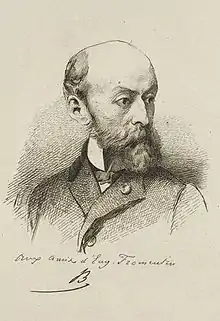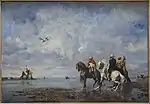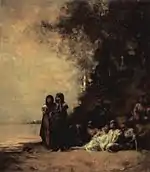Eugène Fromentin
Eugène Fromentin (October 24, 1820 – August 27, 1876) was a French painter and writer,[1] now better remembered for his writings.
Eugène Fromentin | |
|---|---|
 | |
| Born | 24 October 1820 |
| Died | 27 August 1876 (aged 55) La Rochelle |
| Nationality | French |
| Education | Louis Cabat |
| Known for | Painter, Author |
| Movement | Orientalist |
Life
He was born in La Rochelle. After leaving school he studied for some years under Louis Cabat, the landscape painter. Fromentin was one of the earliest pictorial interpreters of Algeria, having been able, while quite young, to visit the land and people that suggested the subjects of most of his works, and to store his memory as well as his portfolio with the picturesque and characteristic details of North African life. In 1849, he was awarded a medal of the second class.[2]
In 1852, he paid a second visit to Algeria, accompanying an archaeological mission, and then completed that minute study of the scenery of the country and of the habits of its people which enabled him to give to his after-work the realistic accuracy that comes from intimate knowledge.[2]
His books include Les Maîtres d'autrefois ("The Masters of Past Time", 1876), an influential appreciation of Early Netherlandish painting and the Northern Baroque of the Old Masters of Belgium and Holland, Dominique and A Summer in the Sahara. In Les Maîtres d'autrefois he deals with the complexity of paintings by Rubens, Rembrandt and others, their style and the artists' emotions at the time of creating their masterpieces. He is also one of the first "art critics" to approach the subject of The Old Masters from a personal point of view - being a painter himself. He also puts the work in a social, political and economic context, as the Dutch Golden Age painting develops shortly after Holland won its independence. The book developed from articles for journals. Meyer Schapiro has written an essay on Fromentin, "Eugene Fromentin as Critic".[3]
His first great success was produced at the Salon of 1847, by the Gorges de la Chiffa. Among his more important works are:
- La Place de la Brèche[4] à Constantine (1849)
- Enterrement Maure (1853)
- Bateleurs nègres (1859)
- Audience chez un chalife (1859)
- Berger kabyle (1859)
- Courriers arabes (1861)
- Bivouac arabe (1863)
- Chasse au faucon (1863)
- Fauconnier arabe (now at Luxembourg) (1863)
- Chasse au héron (1865)
- Voleurs de nuit (1867)
- Centaures et arabes attaqués par une lionne (1868)
- Halte de muletiers (1869)
- Le Nil (1875)
- Un souvenir d'Esneh (1875)
- Selection of works
 Hunting heron, Algeria, 1865
Hunting heron, Algeria, 1865 Arabs, 1871
Arabs, 1871 Moroccan Horsemen at the Foot of the Chiffra Cliffs
Moroccan Horsemen at the Foot of the Chiffra Cliffs Un Souvenir d'Esneh, 1876
Un Souvenir d'Esneh, 1876
Fromentin, who maintained that "art is the expression of the invisible by means of the visible", was much influenced in style by Eugène Delacroix. His works are distinguished by striking composition, great dexterity of handling and brilliancy of colour. In them is given with great truth and refinement the unconscious grandeur of barbarian and animal attitudes and gestures. His later works, however, show signs of an exhausted vein and of an exhausted spirit, accompanied or caused by physical enfeeblement.[2]
But it must be observed that Fromentin's paintings show only one side of a genius that was perhaps even more felicitously expressed in literature, though with less profusion. Dominique, first published in the Revue des deux mondes in 1862, and dedicated to George Sand, is remarkable among the fiction of the century for delicate and imaginative observation and for emotional earnestness.[2]
Fromentin's other literary works are Visites artistiques (1852); Simples Pèlerinages (1856); Un été dans le Sahara (1857); Une année dans le Sahel (1858). In 1876 he was an unsuccessful candidate for the Academy. He died suddenly at La Rochelle on August 27, 1876.[2]
See also
References
- Speake, Jennifer, ed. (2003). Literature of Travels and Explorations. Vol. 1 A to F. New York: Taylor & Francis Books. pp. 471–472.CS1 maint: extra text: authors list (link)
- Chisholm 1911.
- Eugene Fromentin as Critic - Meyer Schapiro, Theory and Philosophy of Art: Style, Artist and Society, Selected Papers, George Braziller, New York, 1994.
- "La poste - Constantine (Algérie)". www.engival.fr.
Attribution:
 This article incorporates text from a publication now in the public domain: Chisholm, Hugh, ed. (1911). "Fromentin, Eugène". Encyclopædia Britannica. 11 (11th ed.). Cambridge University Press. pp. 246–247.
This article incorporates text from a publication now in the public domain: Chisholm, Hugh, ed. (1911). "Fromentin, Eugène". Encyclopædia Britannica. 11 (11th ed.). Cambridge University Press. pp. 246–247.
External links
| Wikiquote has quotations related to: Eugène Fromentin |
![]() Media related to Eugène Fromentin at Wikimedia Commons
Media related to Eugène Fromentin at Wikimedia Commons
- Encyclopædia Britannica
- Works by Eugène Fromentin at Project Gutenberg
- Works by or about Eugène Fromentin at Internet Archive
- www.eugenefromentin.org Works by Eugène Fromentin